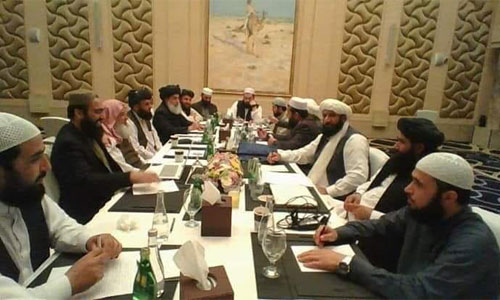Amidst growing confusion and opposition, the first ever round of intra Afghan dialogues was supposed to take place in Doha, capital of Qatar on Friday, but after Controversy over size of Afghan Delegation it has postponed to unknown time. The Afghan government had issued a list of 250 persons which included government officials, religious scholars, civil activists, political activists, women and journalists. Subsequently, Taliban objected to the government lengthy list of participants, saying it is not an invitation to some wedding at a hotel in Kabul. However, according to the latest statement issued by government saying Qatar has cancelled the meeting due to the long list issue.
This comes after Taliban delegation’s list for Doha talks were finalized and they were supposed to be headed by Abbas Stanekzai includes Salaam Hanafi, Amir Khan Mutaqi, Abdul Latif Mansour, Matiulhaq Khales, Abdul Manan Omari, Sayed Rasoul Haleem, Shahabuddin Delavar, Din Mohammad, Abdul Rahman Madani, Mullah Zahid Ahmadzai, Suhail Shaheen, Mohammad Fazel Mazlum, Khairullah Khair Khwa, Mohammad Nabi Omari, Abdul Haq Waseq, Mullah Noorullah Noori, Ziaulhaq Madani, Abdul Ahad Jahangirwal, Amar Yaser, Merza Gul Saleh, Mohammad Naim Wardak, Mullah Daud Abed, Mohiuddin Sadat, and Rasool Ul Haq Aziz.
Taliban also criticized on participation of government officials in Doha peace talks. As quoted, the Taliban spokesman Zabihullah Mujahid said that the “presence of some participants was completely against the list of what was agreed upon,” and indicated that the inclusion of Afghan government officials was unacceptable. The jihadist group also objected to the fact that the Afghan government, which it derogatorily refers to as the “Kabul administration,” published the list of delegates, which the Taliban says is a proof that the government was trying to take ownership of the conference.
On the other side, president Ghani said the Taliban should realize the fact that the group has no way except to engage in talks with the Islamic Republic of Afghanistan. He added in order to achieve dignified and sustainable peace in the country there is a need for unity, solidarity, and consensus among the people of Afghanistan. He said no Afghan from any layer of the society has been left unharmed from the 40 years of the war imposed on the Afghan people.
Thus, the Former National Security Advisor Rangin Dadfar Spanta said that Afghanistan needs to engage in peace talks and political dialogue with the opponents from a united position and that it should involve a limited team of experts and negotiators familiar with the process rather than sending a large delegation. He suggested that in order to reach to peace, there is a need to engage into the process an inclusive, national and expert team to get breakthrough in the talks with the hostile enemies. He said that the real peace negotiations talks will be held with a small, but expert team in Uzbekistan.
“I don’t think that (former President Hamid) Karzai will participate with a separate team,” said Spanta, referring to Karzai’s participation at the meeting. “Mr. Karzai’s team and I myself want to emphasize that we need to send an inclusive national united team which will include the government of Islamic Republic of Afghanistan, but from a united position. No negotiating teams in the world have been too large, but they included a limited number of people with expertise to engage in political talks which we can differentiate,” said Spanta.
Anyway, the Taliban’s refusal to meet with the Afghan government is nothing new. The group has stated for more than a decade that they will not talk with the Afghan government as it views it as a “stooge” and “puppet” of the US and the West. The Taliban has repeatedly stated that it will consider talking to the Afghan government only when US and NATO forces withdraw from the country. The Taliban has also denounced efforts by the Afghan government to build consensus to conduct talks with the Taliban. Last week, the Taliban urged all Afghans to boycott the upcoming consultative Loy girga that is to include thousands of influential Afghans from all walks of the country. The Taliban called the peace jirga a tool of “the invaders and their stooges” to prolong the Western occupation of Afghanistan.
Following the postponement or cancellation of Doha summit, the EU Ambassador to Afghanistan Pierre Mayaudon called the meetings such as Qatar and Moscow are not peace process, but he said that the EU is ready to cooperate in paving the way for peace talks between the Afghan government and the Taliban. “It is not a peace process until it is a direct talk with the Afghan people and the government,” said Mayaudon. “The Afghan peace process has most probably reached critical moment and we believe that it can be a moment also for Europe to bring progress and to facilitate the conclusion for peace agreement.” He said that the EU will not show flexibility towards making a deal on the gains Afghanistan has made over the past 18 years, specially, in areas of human rights, women’s rights, the rights of the youths and minority rights.
He continued that the peace process must not sacrifice three important elements of the Afghan state: constitutional order, human rights gains and territorial integrity. The envoy also suggested that the presidential election, which is now scheduled for September, should not be linked to peace efforts. “We should discuss peace as if there were no elections, we should discuss elections as if there were no peace process,” Mayaudon said.
Home » Opinion » Doha Peace talks Postponed after Controversy over Size of Afghan Delegation
Doha Peace talks Postponed after Controversy over Size of Afghan Delegation
| Mohammad Zahir Akbari

